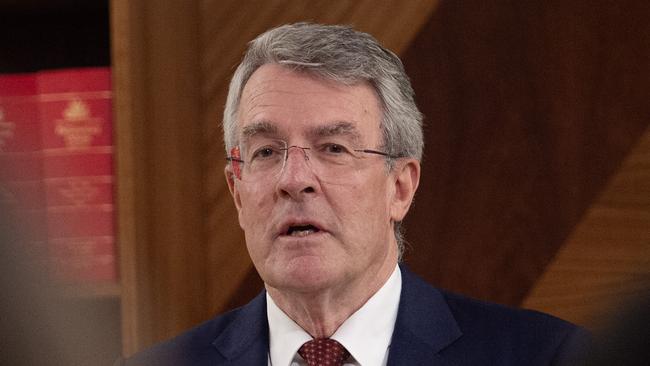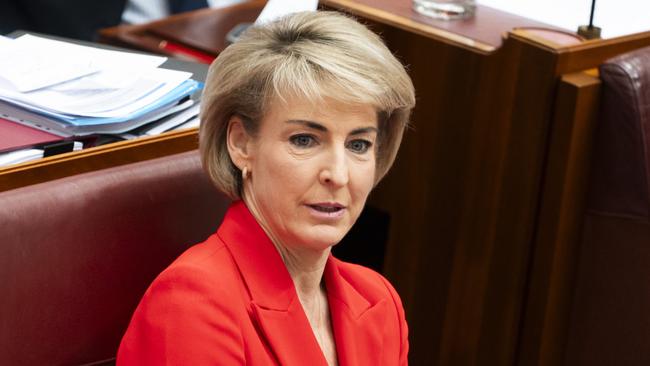Employers left holding the legal bill under sex harassment reforms
Employees who sue companies over sexual harassment and discrimination claims would not have to pay their bosses’ legal fees if they are unsuccessful, under an Albanese government proposal.

Employees who sue companies over sexual harassment and discrimination claims would not have to pay their bosses’ legal fees if they are unsuccessful, under an Albanese government proposal that has sparked a fresh war with business who warn it will turbocharge activist litigation.
The Coalition, business and religious leaders have criticised the Albanese government’s proposal to protect applicants in sexual harassment and discrimination cases from paying the legal costs of their employer if their claims are rejected by the courts.
Attorney-General Mark Dreyfus introduced the bill, which is being examined by a Senate committee, in response to a recommendation in former Sex Discrimination Commissioner Kate Jenkins’ landmark Respect@Work report.
The Australian Chamber of Commerce and Industry is accusing the government of overstepping Ms Jenkins’ recommendations, while religious schools are warning the reforms would force them to raise school fees.
Under the government’s proposal, courts will be unable to order an applicant to pay the respondent’s costs unless the claim is found to be vexatious or without reasonable cause, or that the applicant acted unreasonably and caused the other party to incur costs.
A business will also have to pay the full legal costs of the complainant even if only part of their case is upheld.

ACCI director of workplace relations Jessica Tinsley said the model being proposed was “far too broad, is unfair to small business, and lacks appropriate exemptions”.
“The proposed model would impose a significant barrier to businesses of all sizes to be compensated for their legal costs, even in cases where the court has found that the complainant’s allegations are unfounded,” Ms Tinsley said.
“What is being proposed in this bill was not recommended by the Respect@Work report and is a clear overreach in an attempt by the government to pacify plaintiff law firms and unions.”
The Respect@Work report was commissioned by then Liberal minister for women Kelly O’Dwyer in 2018, following the rise of the #MeToo movement.
Opposition legal affairs spokeswoman Michaelia Cash said the bill was “unbalanced and unreasonable” and effectively strapped a “rocket booster” to the litigation industry.
“Extraordinarily, the Attorney-General has left open the possibility that, if just a single part of a complaint is upheld, the individual or business must pay the costs that the person incurred in making complaints that are rejected,” Senator Cash said.
“Why should an individual or small business pay for somebody else to make an unsuccessful complaint against them?
“If you are a small business, organisation or individual who has had a complaint made against you, this bill means it will likely be a very, very expensive time for you if the complaint ever gets to court. It will mean that the process is the punishment.”

Senator Cash questioned how the bill would interact with future religious discrimination laws and warned it would act as motivation for law firms and trade unions to launch legal action with “minimal consequences for running ambit, low-prospect or speculative representative claims”.
“This bill will affect anyone who might face a discrimination complaint,” she said.
“In particular, it will affect religious schools and churches, if the government’s proposed religious discrimination bill passes the parliament.
“Will faith-based schools now need to factor in the costs of expensive class action risks?”.
A spokeswoman for Mr Dreyfus said the bill took a considered and balanced approach that weighed the “potential of proceedings to magnify existing financial and power disparities between individual applicants and certain respondents”.
“The Australian Human Rights Commission Amendment (Costs Protection) Bill 2023 represents the final legislative reform required to fulfil the Albanese government’s commitment to implement the recommendations of the Respect@Work report,” the spokeswoman said.
“The Respect@Work report considered that cost reform was required to overcome the deterrent effect that an adverse costs order poses to applicants seeking to commence unlawful discrimination proceedings, and to provide sufficient certainty to parties as to how costs would be awarded.”
ACTU acting secretary Liam O’Brien said workers who were victims of sexual harassment or discrimination should not have to worry about the financial costs imposed on them for seeking justice.
“The bill ensures that applicants don’t face the risk of being unfairly saddled with legal costs,” Mr O’Brien said.
“We welcome this change, as does a broad coalition of organisations. The bill will mean more women will feel comfortable to come forward if they experience sexual harassment or discrimination. This is exactly what should happen under an effective justice system.”
Christian Schools Australia director of public policy Mark Spencer said the bill would force up school fees due to increased insurance costs for religious schools.
“The advice we have received is that these changes could turbocharge risk free activist litigation and tie schools and other bodies in legal knots,” Mr Spencer said.
“Insurers have indicated to us that these changes may lead to sharp increases in premiums, increasing school costs further at a time when they are already dealing with significant cost increases.”
The Law Council of Australia wrote in a submission to the review into the cost model for federal anti-discrimination laws in April that there was a split within the legal profession on which model provided the best access to justice.
“Many practitioners are of the view that the proposed cost-neutrality models raise access-to-justice concerns, on the basis that those models would make legal representation harder for parties to secure,” the submission said.
“The two options that attracted the most support from the profession are the equal-access model and maintaining the status quo.”
Kingsford Legal Centre director Emma Golledge said a cost-neutrality approach would not address access-to-justice issues currently facing the system, with many victims relying on pro-bono legal assistance or else walking away with nothing.
“The problem with that is that damages in these matters are really low so we would have people who got very little settlement out of their matters so once they paid their lawyers, they came out with nothing,” she said.
“But also it really relied on lawyers acting for free in this area, and it was kind of no deterrent for employers to go OK, we’ve got a problem here because they just built it into their models.”







To join the conversation, please log in. Don't have an account? Register
Join the conversation, you are commenting as Logout